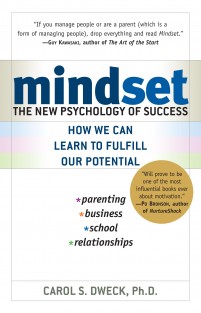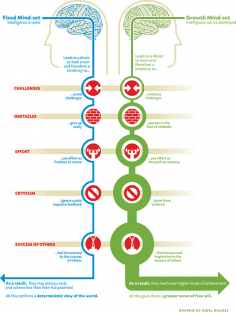Please forgive me if you have already heard me refer to the concept of “growth mindset,” a notion we owe to the renowned Stanford psychologist Carol Dweck, whose book, Mindset: The New Psychology of Success, is one of the most thought-provoking texts about human psychology to have been published in a long time. For Dweck, much of how people approach the challenges they face in life, as well as the way in which they define their sense of satisfaction in meeting those challenges, hinges on the outlook they have on the world. NB. If you do not have the chance to read her book in full, I would highly recommend an article describing her work that was published in New York Magazine a few years ago, entitled “How Not to Talk to Your Kids“, or this brief interview on YouTube:
 Based on research she conducted with fifth-grade students, Dweck argues that the mindsets which children acquire through family upbringing and formal education fall into two categories: those which are fixed and those which are growth-oriented. The definition of the former is simple: people with a fixed mindset look at personal qualities like musical talent or verbal intelligence as pre-determined assets with which a person is either born or not. Those with a growth mindset, however, perceive individual qualities as being accessible to all on the condition that one makes an effort to cultivate them. And depending on which of these two mindsets a student develops – bearing in mind that children are influenced to adopt one or the other from their earliest years onwards – that student, continues Dweck, will approach the problems and opportunities they encounter throughout their lives in very different ways.
Based on research she conducted with fifth-grade students, Dweck argues that the mindsets which children acquire through family upbringing and formal education fall into two categories: those which are fixed and those which are growth-oriented. The definition of the former is simple: people with a fixed mindset look at personal qualities like musical talent or verbal intelligence as pre-determined assets with which a person is either born or not. Those with a growth mindset, however, perceive individual qualities as being accessible to all on the condition that one makes an effort to cultivate them. And depending on which of these two mindsets a student develops – bearing in mind that children are influenced to adopt one or the other from their earliest years onwards – that student, continues Dweck, will approach the problems and opportunities they encounter throughout their lives in very different ways.
Emphasizing the effort over the innate intelligence of the students compel them to take risks and challenge themselves
The fifth-grade study Dweck piloted went as follows. Her research assistants would take individual fifth graders out of their classes one at a time and give each student a non-verbal IQ test, which had been designed so that everyone could do well. The Dweck team would then tabulate the fifth grader’s score and let him or her know his or her results on the spot, along with one line of praise. To some of the students, on a random basis, they would say, well done, you must be intelligent, while to the other students, they would add, bravo, you have clearly worked hard! Next, the researchers would ask each of these same fifth graders to choose between two additional tests, one described as being of the same level of difficulty as the first and the second as being harder than the original. They also made sure to affirm: now that you have learned a lot from the first test, you should be able to tackle the more difficult second test if you elect to do so. The research focused on measuring the relationship between the nature of the praise which the fifth graders received after the first test, and their willingness to tackle the harder test when given the opportunity to do so. Any guess as to the outcome?

To my mind, what this research team discovered is extraordinarily compelling. Most of the students who had been extolled for their intelligence opted to do the easier test. 90% of the fifth graders who had been lauded for their efforts, on the other hand, elected to tackle the more difficult one. For the former, it was as if the label of intelligence had impeded their readiness to risk losing it, should ever they fail to continue validating that label in the future, as if suggesting that their intelligence was innate had placed boundaries around their capacity for learning. Yet for the latter, the emphasis on effort as being the key to success appeared to free them to embrace the unknown, to exploit their potential to the fullest with remarkable enthusiasm. In short, a fixed mindset seems to reflect and instill limitation, whereas a growth mindset appears to attest to and foster, well, growth! Dear reader, if you are wondering about my point in sharing the Dweck research with you today, please know that I have been inspired to do so by our own educational community. Students, faculty, staff, parents: we have this “growth mindset” in common, n’est-ce pas?
About the Author :
Sean Lynch was Head of School at the Lycée Français de New York from 2011 to 2018, after having spent 15 years at another French bilingual school outside of Paris: the Lycée International de St. Germain-en-Laye. Holding both French and American nationalities, educated in France (Sciences Po Paris) and the United States (Yale), and as the proud husband of a French-American spouse and father of two French-American daughters, Sean Lynch has spent his entire professional and personal life at the junction between the languages, cultures and educational systems of France and the United States. In addition to being passionate about education, he loves everything related to the mountains, particularly the Parc National du Mercantour.
